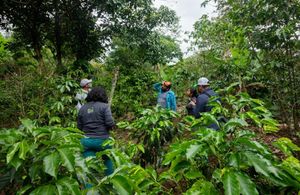UK PACT helps mitigate the effects of climate change in Mexico
UK PACT supports coffee producing communities in Veracruz, Mexico with projects to mitigate the effects of climate change.

A group of 5 people talk, surrounded by vegetation
UK PACT implements a project in Mexico to help coffee producing communities in the state of Veracruz to mitigate the effects of climate change, seeking to improve their quality of life through planting tree species that favour the conservation of the biodiversity of their ecosystems and that have a wider benefit for these communities.
The project consists in developing a methodology for the selection and agro-ecological management of species with high potential for carbon sequestration, as well as an effort to conserve the native tree species of the Veracruz mountain range. The project also aims to benefit the small coffee producers by planting trees that contribute to a higher quality of life for the communities, taking into account the possible utilities and cultural aspects of each species.
Before commencing activities, the implementing partners of the project received training on gender equality and social inclusion. During three days of participative workshops, two gender experts – from Mexico’s National University (UNAM) and the FCDO – led sessions around gender, the role of masculinities and about effective communication with a gender perspective.
A key objective of the workshops was to raise awareness about the provisions established in British law, that oblige all international cooperation programmes to account for a gender equality and social inclusion perspective. As such, this project is expected to implement with the care of acknowledging the realities and perspectives of women and other vulnerable groups that participate in the cultivation of coffee. This has the purpose of making sure that the benefits obtained from this programme contribute to closing gender gaps and promoting an authentic inclusive economic growth.
The participants of the workshops expressed the importance of understanding the role of women in agricultural, forestry and particularly in the production of coffee in the Coatepec region. The participants of the workshops considered that their learnings have influenced their life in general and consequently has impacted in their work. Professor Cesar Flores, from Iztacala’a campus of UNAM considers that:
The workshops were of great importance, given that they entailed a complete revision of the concepts of gender and how their observance can have a positive impact in the development of projects of carbon sequestration.
In the particular case of this project in Veracruz, gender perspective applies greatly given that an important number of women and their families participate in the labours related to the cultivation of coffee and handling of the biodiversity, in a process of mutual support and learning.
Likewise, Flor G. Vázquez Corzas, member of Pronatura Veracruz, one of the implementing partners, shares that:
The topics of the workshops were of great relevance, and necessary themes to integrate in the project, just in time to begin working with the people in the communities and consider an inclusive perspective in the design of materials, from the attendance rosters, invitation and the development of workshops, among other things.

A group of people are having an informal conversation inside a rural classroom
The project kicked-off activities in June of this year and is expected to culminate in March 2023, with the planting of the tree species that may best benefit the coffee agro-producing communities in Veracruz. The project will also produce global public goods, a series of guides and didactic multimedia that will facilitate the replicability of this project in other regions of Mexico or in other geographies around the world suitable for this project.